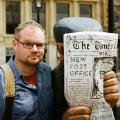Stop talking about the past and focus on the future.
That’s what author’s of the Scotland Urban Age report declared in their recent focus on Glasgow.
The report outlines how the city can become a leading player globally through growing their “knowledge economies”, increasing productivity and tackling the problems of low skills and low pay.
Report author, Brian Evans, from the Glasgow Urban Laboratory, said: “We must desist from talking about Glasgow as post-industrial and start talking about a proto-knowledge city.”
He insisted Glasgow was a “knowledge city” with three universities in the city centre and west end and knowledge-based businesses in the Blythswood Square area and international financial services district in the Bothwell Street and Atlantic Quay areas.
But what does that mean, if anything, to residents of Drumchapel, or Knightswood, or Yoker, or the industry of the BAE Systems shipyard in Scotstoun? What does it mean for Clydebank where the John Browns yard will become housing in the next decade?
Are they benefitting from or gaining access to what’s going on in the centre?
Chris Cunningham, SNP councillor for Garscadden/Scotstounhill and convener for education, skills and early years, said it was still a fact that Glasgow has an industrial heritage after its first phase as a merchant city thriving off the tobacco trade.
And Glasgow has had to change and adapt, struggling with that over the past four decades, but residents do need to embrace the digital future.
“We tend to gloss over the level of some of the disruption,” he said. “Industrial Glasgow was a very brutal place to live.
“It doesn’t matter what the nature of work is, we cannot escape the need for digital IT understanding.
“You needed to read industrial manuals 100 years ago. The equivalent today is reading IT equipment.
“People need a high level of skills and knowledge whether they work in a factory or not.”
When the Thriving Places project in Drumchapel reported earlier this year on the area, there was no mention of industry, nor the knowledge economy. But residents did highlight the gap between those in charge and those who live in locally.
One quote in the report said: “Back in the day, there were people who made decisions about this area who actually lived here and they would get things done. If you needed something done, you would see them about it.”
Would changing terminology for the city’s economy help solve a wide range of problems in the area? Does it connect to residents?
Eva Murray, Labour councillor for Garscadden/Scotstounhill, agreed the knowledge economy was an opportunity for Glasgow.
“Our biggest challenge is to ensure all of our citizens are able to take part and benefit in this,” she said.
“That’s why the fact that Glasgow, although ‘knowledge economy’ intensive, still has one of the highest proportion of the population without any formal skills is of serious concern.
“I believe this is of particular concern in communities like Garscadden/Scotstounhill, areas which have a proud history of manual, traditional work such as shipbuilding and where we still see strong links, those are the Glaswegians at risk of being forgotten.
“Therefore, we need to put the work in now to make sure that all of our citizens have access to the skills they need to thrive in the economy of the future, to go forward with the skills and confidence to be ready for those jobs that haven’t even been created yet and we do that by properly investing in the generations of today and those of the future.”
Drumchapel’s 2017 plan aims for local training and education - under local control, in Drumchapel - by 2020.
The Thriving Places report summarises the desire for training and skills. But its focus is on the local needs of, and service to, residents – not the terminology of the past, present or future.











Comments: Our rules
We want our comments to be a lively and valuable part of our community - a place where readers can debate and engage with the most important local issues. The ability to comment on our stories is a privilege, not a right, however, and that privilege may be withdrawn if it is abused or misused.
Please report any comments that break our rules.
Read the rules here